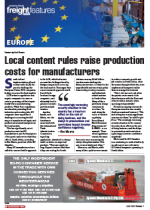So uth A f r ica’s implementation of local content rules (LCR) has posed a challenge for European Union (EU) companies looking to access the local market.LCR refers to regulations that require companies to source a certain percentage of their inputs locally when manufacturing products. While these regulations are aimed at promoting local industries and creating jobs, EU companies have experienced challenges in accessing the full range of manufactured inputs and products at international prices in the local market.This has significantly raised production costs for EU manufacturers and the final prices of the goods and services that they offer in South Africa, according to Rui Marto, president of the EU Chamber.Many EU manufacturers have called for a more f lexible approach to the LCR, which takes into account the challenges faced by foreign companies in accessing the local market. They argue that a more nuanced approach would benefit both local and foreign companies, and ultimately lead to greater economic growth and job creation.Another hurdle, said Marto, was the timeframes associated with the International Trade Administration Commission regarding applications submitted to change tariffs or duties on imported products. “They are simply too long. Reports contend that these delays are costing the South African economy R1.25 billion. Another main challenge for European investors is related to the unpredictable and uncertain policy framework governing economic- and industrial-related matters in South Africa. Many of these provisions change continuously over time,” he said, citing the codes of conduct regulating Broad-Based Black Economic Empowerment – B-BBEE – as an example. “Even when regulations remain the same, there are issues concerning the clarity of implementation. This causes uncertainty and delays.”Moreover, said Marto, while many of these policies were meant to achieve economic growth and job creation in South Africa, often the means through which they were implemented hampered rather than encouraged investment.“This is the case not only when the private sector wants to do direct business with the State and related entities, but also when operating independently.”He said an ongoing concern for European investors was security (both personal and business). “This and corruption remain significant concerns for them,” he told Freight News. “The seemingly worsening security situation in the country has a knock-on effect on the cost of doing business, and the delays in prosecutions and convictions again impact investor confidence negatively.”Marto said the EU Chamber was continuing to work relentlessly on advocacy issues relevant to EU-linked companies operating in South Africa.

